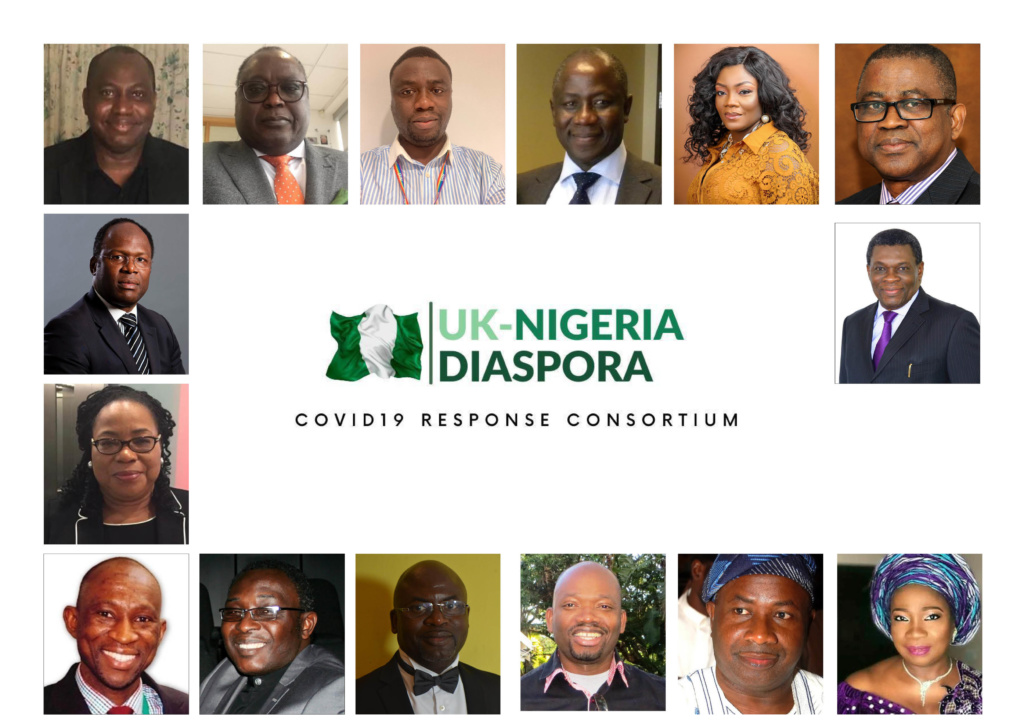
By Professor Rotimi Jaiyesimi – The world was taken by surprise in December 2019 by the emergence of the SARS-CoV-2 virus which causes the COVID-19 disease. It became a global public health issue as viral spread across nations left in its wake, deaths and untold disruption to our normal way of life. The disease was declared a pandemic by the World Health Organisation (WHO) in March 2020.
The UK-NIGERIA Diaspora COVID-19 Response Consortium, made up of 15 inter-sectoral experts, was established in May 2020 to contribute to the efforts to curtail the disease in Nigeria and the diaspora.
The Consortium, through its members and as a group was involved with the Presidential Task Force on COVID19, the Federal Ministry of Health Case Management Team, and State governments’ COVID operational command.
The Consortium submitted a policy document on Infection Prevention and Control measures towards the preparedness for further waves of the pandemic. In addition, the Consortium made significant contributions to the emerging knowledge of the infection through publications in scientific journals and webinars.
The convenor, Prof Rotimi Jaiyesimi, stated that the pandemic provided Nigeria with the opportunity to strengthen its health system, enhance its pandemic preparedness and the response to other urgent public health problems. He acknowledged the support received from Hon Abike Dabiri-Erewa, Chairman/CEO of Nigerians in Diaspora Commission (NIDCOM) and the African Voice Newspaper UK.
The Consortium expects the economic and health (Long COVID) impact of the pandemic to continue into the coming years and will continue to make contributions towards improving disease surveillance and control in Nigeria.
Ongoing studies undertaken by members of the Consortium into quantitative antibody responses to the Covid19 vaccination would help shape the future of the vaccination programme. Preliminary results show an immune response 14 days after the first dose of the Astra Zeneca vaccine with a further rise in IgG levels over the following 7 days (Day 21); see Graph. Paradoxically, there was a decline in the antibody levels over 9 days (Day 30). We are mindful that these are early results. However, the antibody levels may represent varying individual response to the vaccine.
This study will continue over the next six months and the study results may provide an answer as to how often the vaccines will be required.
Scientific publications from members of the Consortium include, Commentary on the Simulation Tool Developed by Imperial College, London for 137 Low- and Middle-Income Countries Using Nigeria a As a Case Study (July 8, 2020), https://ssrn.com/abstract=3645961 by Aluko, Emmanuel & Jaiyesimi, Rotimi; and contributions to the Proceedings of the Nigerian Academy of Science, The Potential Benefit of Mouthwashes in Reducing COVID-19 Viral Load: A Mini Review by Rotimi A. Jaiyesimi, Olugbenga S. Oyeniyi, Foluke Bosun-Arije, https://doi.org/10.5423/pngas.v13i1s.214.
Members of the Consortium are Prince Mike Abiola Publisher & Editor in Chief of African Voice Newspapers; Emmanuel Aluko, CFA, (Data & Financial Analyst); Mr Ibrahim Bolaji, Consultant Obstetrician & Gynaecologist and Senior Clinical Lecturer; Dr John Bolodeoku, Life Science Consultant; Liz Ekanem, RN, RM, MPH, Midwifery Practitioner; Professor Baba Inusa, Chair, National Haemoglobinopathy Panel, England and Chief Investigator African Research and Innovative Initiative for Sickle Education; Dr Collins Iwuji Clinical Senior Lecturer in Sexual Health & HIV Medicine, Clinical Epidemiologist Honorary Consultant Physician; Professor Rotimi Jaiyesimi, Consultant Gynaecologist, International Health Consultant, Global Health and Clinical Governance Expert; Dr Julian Mamiso, Consultant in Reproductive Medicine, Care Fertility Centre Bath UK; Dr Adegbola Ojo
Director of Teaching and Learning, School of Geography and Lincoln Centre for Water and Planetary Health, University of Lincoln; Wendy Olayiwola, BEM, National Maternity Lead for Equality NHS England and NHS Improvement, and Professional Midwifery Advocate; Peter Olorunnisomo FRSA Consultant – Public Sector and Governance, Media/Public Relations, Writer; Dr. Olugbenga Oyeniyi NHS Senior Scientist (Microbiology) and Dr Patrick Uwubanmwen, Family Physician, Global health enthusiast, CEO, Spem Quia Filii Foundation.
Kindly follow us on twitter:@AfricanVoice2









